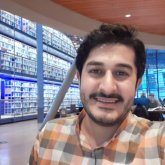PhD Opening: Reinforcement learning in human neuromusculoskeletal models for the control of human-inspired musculoskeletal robots.
Are you passionate about creating next-generation robots that can mimic the human neuromuscular system at the level of muscle-like actuation, neural control of movement and versality in the real world? We call this Human-Inspired Musculoskeletal Robotics, which is poised to push the envelope in autonomous (e.g., humanoids, quadrupeds robots) and assistive robots (e.g., bionic legs, arms or exoskeletons). This project is funded by the Swiss National Science Foundation to enable cross-border collaboration between ETH Zürich’s Soft Robotics Lab and the University of Twente’s NeuBotics Lab.
We’re seeking for motivated candidates that are interested in developing computer models of the composite human neuro-muscular system that combine detailed musculoskeletal geometries, muscle-tendon models and neural control pathways (e.g., CPG-like and reflexive). Moreover, candidates will be required to develop reinforcement learning techniques to teach such neuromuscular models to execute a broad range of movement as well as performing the “sim2real” step for the control of physical musculoskeletal robots in the real world, i.e., use cass include neuromuscular model-based control of robotic legs and arms for both autonomous and prosthetic applications.
If you’re excited by all this, we encourage you to apply.
The opening:
In this project, you will develop:
- Detailed, large-scale computer models of the composite human neuro-musculo-skeletal system (NMS) that incorporate neural control strategies (i.e., CPG-lie and reflex pathways), muscle-tendon units with variable stiffness and damping properties and 3D musculoskeletal geometries. Info.
- Novel reinforcement learning (RL) strategies to teach NMS models to execute a broad repertoire of movemets in presence of external disturbances. Info.
- Simulation-to-real-world transfer, where NMS model control policies acquired via RL are flashed on a physical robot to operate in the real world.
Your tasks will be:
Your core tasks will include using the MyoSuite framework to:
- Development of computer models of the musculoskeletal system incorporating neural control pathways
- Train NMS model control policies via RL
Your seconday tasks will include:
- Using learned NMS model control policies to control real-world robotic legs and arms.
About the Lab
The NeuBotics Lab is a multidisciplinary team at the forefront of neuromechanics and assistive robotics. Our work bridges neuroscience, biomechanics, and robotics to develop real-time models of joint biomechanics and adaptive control strategies for wearable exoskeletons and bionic limbs. You’ll be part of a dynamic, collaborative environment that values innovation, rigor, and translational impact.
Information and application
Apply by 23:59 on November the 23rd, 2025.
Interviews will take place in the week of December 1st.
Expected starting date is no later than February 1st, 2025.
Screening is part of the procedure.
Applications should include the following documents:
- A video (2-minute max) describing your scientific interests and why you are applying for this position.
- A cover letter (1-page max) specifying how your experience and skills match the position as well as summarizing your scientific work.
- A CV including English proficiency level, nationality, visa requirements, date of birth, experience overview, and publication list.
- Contact information for at least three academic references. A support letter will be requested by us only if your application is considered
For more information on the open position, you can contact Prof. Massimo Sartori, mail: m.sartori@utwente.nl. Please, only apply via the web platform. Please, do not apply via email.
About the organisation
The Faculty of Engineering Technology (ET) engages in education and research of Mechanical Engineering, Civil Engineering and Industrial Design Engineering. We enable society and industry to innovate and create value using efficient, solid and sustainable technology. We are part of a ‘people-first' university of technology, taking our place as an internationally leading center for smart production, processes and devices in five domains: Health Technology, Maintenance, Smart Regions, Smart Industry and Sustainable Resources. Our faculty is home to about 2,900 Bachelor's and Master's students, 550 employees and 150 PhD candidates. Our educational and research programmes are closely connected with UT research institutes Mesa+ Institute, TechMed Center and Digital Society Institute.




